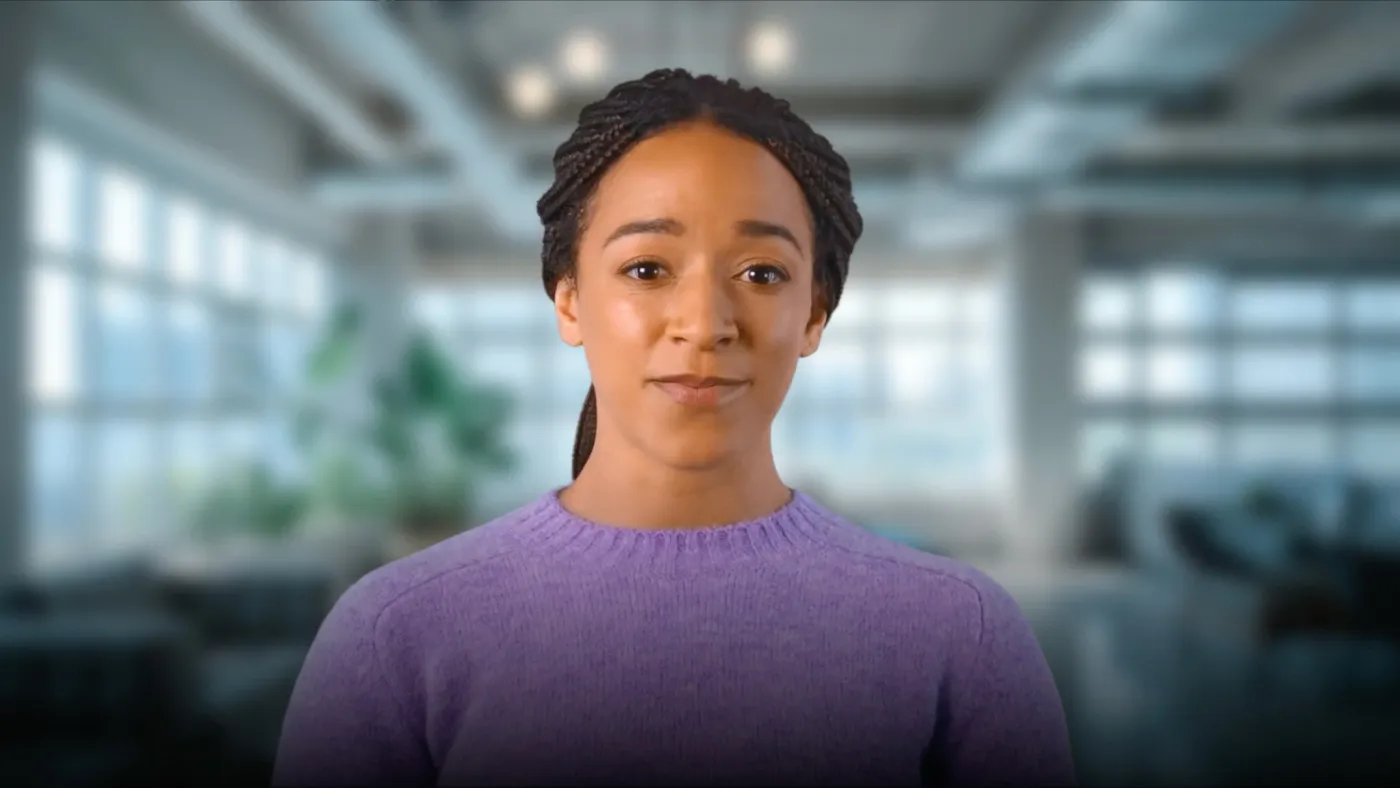

Turn your texts, PPTs, PDFs or URLs to video - in minutes.

Our ranking of the alternatives to HeyGen:
Comparing the 5 best HeyGen alternatives
I tried out 5 of the most popular HeyGen competitors. Here's what I found.
Note: If you're looking for free HeyGen alternatives, all of the competitors below offer free plans that allow you to generate videos without providing your credit card details.
1. Synthesia
Synthesia is an AI video generator that helps you create realistic videos on any topic in over 140+ languages.
It offers an easy-to-use interface that doesn't require any video editing skills and comes with high quality AI and personal avatars, dynamic video templates, a screen recorder, a free media library, and real-time collaboration features.
Synthesia is rated 4.7/5 on G2 based on more than 1,700 reviews.
What I Loved About Synthesia
- Incredibly realistic AI avatars: The AI avatars you can generate in Synthesia are the most realistic I’ve seen
- Support for multiple avatars: being able to include multiple avatars in a single video made it so much easier to create engaging conversations or dynamic scenarios that felt natural and interactive
- Multilingual video player: The multilingual video player automatically translates videos into the viewer’s language, allowing you to reach global audiences effortlessly
- Broad language support: With support for over 140 languages, I never had to worry about whether I could localize a video properly
- Unique live collaboration features: Collaboration is essential for many of my projects, and Synthesia’s live collaboration tools made working with my team seamless. We could edit, review, and tweak videos together in real-time
- Advanced AI screen recording: The advanced screen recording capabilities made it easy to incorporate visual elements and demonstrations directly into my videos
- SCORM export functionality: As someone who often creates training content, I found the SCORM export functionality incredibly useful. It ensured my videos were compatible with LMS platforms
- Detailed video analytics: The built-in analytics helped me track the performance of my videos and understand viewer engagement
- Diverse video templates: Synthesia offers a wide range of templates for different use cases. Whether I needed a training video, a product demo, or a promotional clip, there was a template ready to go
- Intuitive video editor: Synthesia's AI video editor is easy to use. It's similar to making a powerpoint presentation, so it all felt very familiar and straightforward
What Could Be Improved
- No custom photo avatars: One limitation I noticed is the inability to create custom photo avatars
- Higher price point: Synthesia is on the pricier side compared to some competitors. While the features are worth the investment for me, I can see how this might be a hurdle for those with tighter budgets
For more details check out our in-depth comparison of HeyGen and Synthesia.
Synthesia pricing
Synthesia offers free AI text-to-video generation and four main plans based on the number of videos you need:
- The free plan allowed me to get started with 3 minutes of video per month and no credit card required
- The starter plan is best for individuals or small teams, as it's priced at $29 per month ($18 per month when paying yearly) and provides a robust set of tools and avatar options
- The creator plan is best for small teams who create videos professionally; it's priced at $89/month ($64 per month when paying yearly). Features like custom fonts and branded video pages make this plan ideal for businesses and content creators who produce regular, high-quality video content with brand-specific elements. The team collaboration feature also allows multiple users to work together seamlessly
- The enterprise plan is designed for larger organizations with extensive video production needs
2. Colossyan
Colossyan is an AI-powered video creation platform that lets users produce videos featuring AI-generated avatars. It supports over 70 languages and offers customizable avatars.
What I Loved About Colossyan
- L&D focus: The platform offers scenario-based learning tools, the ability to upload PowerPoint or PDF files, and SCORM export support, which all make it a better fit than HeyGen for learning & development content
- Cost-effective pro plan: The pro plan at $87/month for unlimited video stood out as a good value for money. If you’re planning to create a lot of videos, this pricing is much more affordable than many other platforms I’ve used
What Could Be Improved
- Lower quality avatars: I didn't find Colossyan's AI avatars particularly life-like, which harmed the professionalism of my videos
- Limited avatar selection: The avatar selection felt limited - they only offer around 30 stock avatars
- Longer rendering times: I noticed that the rendering times were a bit slow. It typically took over 10 minutes to render a 40-second video, which made it hard to keep up my momentum when I was working on a video
- Fewer templates and media options: The platform doesn’t have as many templates or media resources as the other options I’ve tried. I often found myself having to start videos from scratch
- No versioning or real-time collaboration: For team-based projects, I found the lack of version control and real-time collaboration tools to be a drawback
- No multilingual player: This is a big disadvantage if you want your video to reach global audiences
- No video analytics: I couldn't get details on how my audience was engaging with my video
- Limited language support: The platform supports about 70 languages, so there might be some gaps in coverage if you are doing a lot of videos for international audiences
Colossyan pricing
Colossyan offers three main pricing plans.
The pro plan at $87/month offers the best value with unlimited video creation, 45 avatars, 15 avatar conversations, and advanced features like AI image generation, 10 auto-translations, and multiple export options. It’s ideal for small to medium teams needing collaborative tools and dynamic content creation.
3. Elai.io
Elai.io is an AI-powered video creation platform that enables users to produce professional-quality videos featuring customizable digital presenters. It provides voice-uploading capabilities, professional editing tools, and customizable templates in over 130 languages.
What I Loved About Elai
- AI storyboard feature: Elai’s AI storyboard tool quickly became one of my favorite features. With just a single prompt, it helped me organize content, visuals, and narration into a cohesive video outline. It made the planning stage feel effortless
- Broad language support: Elai supports around 130 languages, so they probably support the languages you need
- Automated translation: The one-click translation feature let me instantly localize my videos into multiple languages without having to manually tweak anything
- SCORM export functionality: Which is available on the enterprise plan
What Could Be Improved
- Smaller avatar library: Elai’s selection of over 80 avatars felt a bit limited to me
- Unrealistic avatars: Elai's avatars don't have lifelike micro-expressions and customizable gestures. These details can make a big difference in how polished the final video feels
- Fewer templates: Elai’s template library felt pretty sparse compared to the other alternatives. I often found myself starting from scratch
- Lip-sync quality: The lip-syncing wasn’t quite as natural as I’d hoped, and it especially stood out in longer videos
- Rendering time: Rendering videos on Elai sometimes took longer than I expected. After experiencing faster processing times with the other platforms, this was a noticeable downside for me
Elai pricing
Elai.io offers a free demo and three plans:
The basic plan at $29/month works for small businesses and creators needing limited video production. It includes 15 minutes of video time, over 80 avatars, no watermark, and basic features like text-to-video and 3 monthly auto-translations. It’s suitable for simpler marketing content or training videos.
4. Hour One
Hour One is an AI-driven video creation platform that enables users to produce professional-quality videos featuring realistic virtual human avatars. It offers a user-friendly interface with customizable templates, text-to-video capabilities, and support for over 80 languages.
What I Loved About Hour One
- Photorealistic avatars: One of the things I appreciated most about Hour One was the quality of its avatars. They’re incredibly lifelike, closely resembling real humans, which added a polished, professional feel to my videos.
- Customization options: I liked having control over avatar expressions, camera angles, and the ability to integrate music or voiceovers. It gave me the flexibility to fine-tune my videos and make them more engaging.
What Could Be Improved
- Lack of micro-gesture technology: While the avatars look realistic, I noticed they lack micro-gesture technology. Without subtle facial movements and gestures, they felt a bit less expressive compared to the other platforms.
- No screen recorder: I also missed having a built-in screen recorder. This is something I’ve found really useful on other platforms for creating tutorials or integrating visual aids.
- Limited avatar library: The smaller library of AI avatars felt restrictive for me. I would have liked more variety to suit different projects.
- Fewer advanced features: Hour One is missing certain advanced functionalities I’ve come to value, like using multiple avatars in a single video. These limitations made it less versatile for creating more complex or dynamic scenes.
- Rendering time: Video rendering took longer than I expected, which slowed down my workflow. Compared to the faster alternatives, this was a noticeable drawback.
- No SCORM export support
Hour One pricing
Hour One offers three pricing plans: Lite, Business, and Enterprise.
While the lite plan is affordable, it lacks branding and collaboration tools. For most teams or small businesses, the business plan strikes a strong balance between features and cost.
5. D-ID
D-ID is a versatile AI video generator platform that uses deep learning facial animation technology, GPT-3 text generation, and Stable Diffusion text-to-image conversion capabilities to create innovative videos.
What I Loved About D-ID
- Photo-to-avatar creation: I liked the ability to create a custom avatar directly from a single photo. It's a fun feature, although I'd still recommend using a high quality webcam for creating custom avatars for professional video creation.
- Historical and famous stock avatars: D-ID also offers a library of historical and famous figure avatars, which I found to be a fun and useful addition. It’s great for adding recognizable personas to videos. Again, it's probably not suitable for professional videos.
What Could Be Improved
- Limited avatar variety: I found the selection to be quite limited—just 25+ AI presenters. Compared to other platforms with more extensive options, this felt a bit restrictive.
- Watermarked videos on basic plans: One big frustration for me was that D-ID’s videos are watermarked unless you upgrade to the advanced plan. This limitation made the lite and pro plans unusable for professional work.
- No commercial license for lite plan: I also noticed that the lite plan doesn’t include a commercial license. This meant I had to upgrade to at least the pro plan for any kind of professional use, which adds to the cost.
- Limited templates and media libraries: I found the lack of video templates and media libraries to be a real drawback. It made creating videos from start to finish much more time-consuming, especially when compared to competitors with robust template options.
- No screen recording functionality: The absence of a built-in screen recorder stood out as a significant limitation for me. It’s a feature I rely on for creating tutorials and walkthroughs, and not having it reduced the platform’s versatility.
- No SCORM export support
D-ID pricing
D-ID has 4 different paid plans plus a free trial.
At $29, the pro plan is relatively affordable and includes a good balance of features, such as 15 minutes of video, access to 3 personal and 3 custom avatars, and 100 AI prompts. This is enough for users needing moderate customization without a high monthly cost.
Why look for a HeyGen alternative?
HeyGen is an AI-powered video creation platform that enables users to produce professional-quality videos featuring AI-generated avatars. It offers a range of features, including customizable templates and text-to-speech capabilities.
HeyGen's limitations
Here are the main disadvantages I found after trying out Heygen for a few days:
- No multi-avatar scenarios: HeyGen doesn’t support multiple avatars in a single video, so I couldn't create conversational scenes
- No real-time collaboration feature: HeyGen lacks real-time collaboration, so I couldn't work simultaneously on a video with someone else (like you would in Google Docs, for example). If you're working on videos with your team, this will be a pain point
- No multi-lingual video player: HeyGen doesn’t have a multilingual video player that lets your audience change the language of your video with one click. This is a pretty big disadvantage if your videos are targeting global audiences
- No SCORM export functionality: Since I often work on training and education videos, HeyGen's lack of support for SCORM exports (which allow you to easily export to Learning Management Systems) is a pretty big disadvantage
- No detailed video analytics: HeyGen doesn’t include built-in analytics, so I can't see how my audience is engaging with my videos. Having access to good video analytics is important, as I need to get feedback on my videos so that I can keep improving them
- Limited avatar selection: HeyGen’s selection of AI avatars is smaller compared to some of the alternative platforms
- Basic gesture and expression control: HeyGen’s avatars lack advanced gestures and micro-expressions, which made them feel less lifelike than those on other platforms
HeyGen pricing
Here’s a summary of HeyGen's pricing plans:
In terms of value for money, I find that HeyGen's creator plan likely provides the best balance for individual creators and small businesses. It removes the watermark, includes HD quality, and allows unlimited 30 minute long videos at a reasonable price.
How to choose the best AI video generation software
Let's go over the things that I was looking for when deciding on which AI video generation platform to use:
- Ease of Use: A straightforward, intuitive interface that minimizes the learning curve, allowing me to start creating quickly
- Branding Capabilities: Options for logos, brand colors, and other brand-specific elements that strengthen brand identity within videos
- Language Support: Multilingual and localization features to reach and engage a global audience effectively
- Content Flexibility: A diverse range of templates suited to different video types (e.g., training, explainer, outreach)
- Avatar and Voice Quality: High-quality, lifelike avatars and AI voices that enhance engagement
- Collaboration and Scalability: Tools for multi-user access, role-based permissions, and collaboration, enabling smooth teamwork
- Cost Effectiveness: A clear return on investment based on the platform’s features, usage volume, and added value
- Data Security: Strong data protection and compliance features, crucial for safeguarding internal content
- Customer Support: Reliable support and resources to help you get the most out of the platform and troubleshoot effectively
About the author
Content Writer & Marketing Expert
Ema Lukan
Ema Lukan is a seasoned Content Writer and Marketing Expert with a rich history of collaborating with marketing agencies, SaaS companies, and film studios.
Frequently asked questions
What are some top alternatives to HeyGen for AI video generation?
Some leading alternatives to HeyGen include Synthesia, D-ID, Colossyan, Elai.io, and Hour One. These platforms offer unique features and capabilities that cater to various video creation needs.
How does Synthesia compare to HeyGen in terms of language support and avatar selection?
Synthesia supports over 140 languages and offers more than 230 AI avatars, providing a diverse range of options for users. In contrast, HeyGen supports around 40 languages and has a smaller selection of avatars. This makes Synthesia more suitable for creating videos tailored to global audiences.
Which AI video generation platform offers advanced gesture and expression controls for avatars?
Synthesia stands out by providing advanced gesture and expression controls for its avatars. This feature enhances the realism and engagement of the videos, as avatars can exhibit micro-expressions and gestures that make them appear more lifelike.











